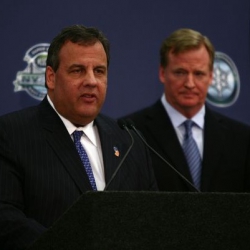A committee consisting of business and commercials leaders in New Jersey estimates that sports betting in the state could be a $11 billion industry, if the practice was legalized. Taxation from legal sportsbooks could total as much as $600 million. Numbers anywhere in the range of the committee’s projections not only would help the treasury of New Jersey, but it would save the failing gambling industry of New Jersey.
New Jersey’s leaders currently are challenging a longstanding federal law which prohibits sports gambling in 46 states, including New Jersey. If Chris Christie, Ray Lesniak, and other lawmakers have their way, then Atlantic City casinos and New Jersey racetracks will be able to open sportsbooks. The state legislature recently passed a sports betting law repeal, which was aimed at getting statute’s aligned with U.S. District Judge Michael Shipp’s interpretation of the federal gaming laws.
Temporary Restraining Order in Effect
Unfortunately, Judge Shipp issued a temporary restraining order against New Jersey’s land-based gaming operators setting up sportsbooks. Monmouth Park in North Jersey had planned to open a sportsbook last weekend in the William Hill Bar & Restaurant on the complex grounds. Within an hour’s ride to New York City, Monmouth Park might have the most to gain from legalized sports gambling in New Jersey.
Despite that possibility, the main reason New Jersey’s political and business leadership wants to see sportsbooks legalized is the impact it would have on the Atlantic City casino industry. At the beginning of 2014, Atlantic City had 12 operating casinos. By the end of the year, only 7 of those casinos will remain open. The casino industry is failing and sports betting is the industry’s best chance to recover.
Lawsuit by Sports Associations
At the same time, the major American sports leagues see New Jersey sports gambling as a threat to the popularity and financial health of their associations. Judge Shipp’s ruling was prompted by a joint lawsuit by Major League Baseball, the NFL, the NBA, the NHL, and the NCAA.
Those associations wanted strict enforcement of the 1992 Professional and Amateur Sports Protection Act, which limited gambling to Nevada, Oregon, Montana, and Delaware. When the law was passed at the behest of those sports leagues, they wanted to ban sportsbooks in all 50 states. A compromise allowed the four states which already had sportsbooks to be grandfathered into the system.
New Jersey Sports Gambling
New Jersey’s casino and racetrack operators have long resented the ban on sports gambling. But in the past ten years, they have begun to see a change in the PASPA law as the last, best hope to save Atlantic City. If ever the Boardwalk casinos could open sportsbooks, they would be able to lure back many of the gamblers from Pennsylvania and New York, who now stay in-state to gamble.
The committee believes New Jersey’s sports gaming industry would bring in three times the revenues that Las Vegas does every year. New Jersey sportsbooks would become the hub of east coast gambling, drawing in gamblers from New York, Philadelphia, and more remote portions of Pennsylvania. With such a wide population base, Atlantic City casinos might post bigger numbers than they did in their best collective year: 2006. In 2006, Atlantic City had $5.4 billion in revenues. In 2013, the revenue stream had dwindled to $2.86 billion. Spreading $11 billion around those casinos and the New Jersey racetracks would be a major windfall for all operators.
Consequences of Defeating the PASPA
It is hard to say how long such revenues would continue, though. If New Jersey succeeded in finding a loophole to the PASPA law, it presumably would open the door for other states to legalize sports betting. In time, Pennsylvania and New York might legalize casinos to operate sportsbooks, and the customer base for New Jersey gambling might shrink once more.
Skepticism about Projections
Opponents of sports betting in the state will say the committee is decidedly pro-gambling. Political enemies of Governor Chris Christie will point out that he predicted licensed online casinos and poker sites would generate $1 billion a year, when the numbers over the first year of legalized online gambling in the state netted something closer to $100 million. To many, the projections offered by proponents of sports betting could be just as wildly optimistic–or outright falsehoods.

